- Home
- Christine Rimmer
WAGERED WOMAN Page 2
WAGERED WOMAN Read online
Page 2
How strange, she thought, bewildered. Could this beautiful little shop actually be crude Sam Fletcher's place of business? He'd had it for—how long now? Eight years or thereabouts, as she remembered. Before that, he'd sold his gold samples and the jewelry he made right out of that beat-up van he used to own.
People had told her that the store was a gem. And she knew tourists came from all over to rent panning and dredging equipment from him. But she hadn't paid much attention to what Sam Fletcher was doing with his life, as long as he kept away from her. And never before had she had the slightest reason to see for herself.
Not that it mattered what his store was like. It didn't matter at all. It just … didn't fit with her idea of him, that was all.
As Delilah stood and stared, the little bell over the door tinkled again. A man and a woman, tourists out for a Saturday drive in the gold country from the look of them, came in.
The woman went immediately to the jewelry cases and began exclaiming over the rings. "Walter, you must look at this one. Please, darling, look. Here."
Delilah backed away, not really thinking that she was moving into the shadows, until she stood in a corner near a tall stand filled with long picks and shovels. The door to the back room opened. She jumped a little, knocking the stand with her elbow and causing it to clatter slightly. At the sound, the man called Walter glanced over and saw her.
But then Delilah forgot all about anyone else, because Sam Fletcher came out of the back room, huge and imposing as always, his lion's mane of red-gold hair bright as fire, his full beard combed and gleaming.
Delilah blinked, recalling, for some strange reason, their first confrontation two decades ago, at her private place by the river.
The memory came at her, swift as a diving hawk. She had no chance to shut it out. She saw Sam Fletcher come out of the back room of his store, and suddenly she was fourteen again and going out the front door of her father's house on her way to her special place by the river where she always went to be alone.
It was early summer, late-morning, and the trees had all their leaves. She was wearing her bathing suit under her jeans, and her hair was braided down her back. The sun was warm on her face when she opened the door.
She let herself out of the house, heaved a little sigh, and felt relief. She was escaping that house, really. Since her mother had died, there was rarely any peace and never any order there. Her father and her brothers thrived on trouble and confusion.
The house, as she left it, was quiet for once. They were all sleeping late as usual. The night before had been pretty bad and each of her brothers had done his part to make it that way.
First, her youngest brother, Brendan, who was thirteen years old, had fallen asleep in his room with a lit cigarette between his lips. Luckily, Delilah had smelled something funny and burst in to find him stretched out on the bed, dead to the world, encased in a greasy cloud of smoke.
Terrified that he might already have suffocated, she tore back to the kitchen, filled the dishpan with water, flew to his room again and threw the water over him. He woke spitting and swearing and calling her terrible names.
But finally he got up and helped her drag the ruined mattress outside where they could douse it thoroughly. Then he stalked back toward his room. She'd followed after him, to insist he not smoke anymore in there.
"Don't lecture me about smoking, Delilah, damn you. You're my sister, not my mom. Mom's dead. Get that through your thick head. I'll smoke if I damn well please!" He'd slammed the door in her face. She'd stood there for a moment, fuming, wanting to pound on the door until he opened it—and then to spit in his mean little face.
But she'd controlled herself. She'd returned to her own room and read for a while, then gone to bed.
She was sound asleep when Patrick, her second brother, came crashing into the house. She woke with a start, and saw that it was almost 2:00 a.m. Patrick kept slamming around out there, so she threw on her robe and went out to see what was the problem.
"What the hell are you sneakin' around about, sis?" Patrick demanded when he saw her. Then he held out his right hand, which had a gash above the knuckles and was dripping blood all over the kitchen floor. "Well, while you're up, find me some bandages, will you, and take care of this?"
She'd gotten him patched up and gone back to bed. But she'd no sooner dropped off to sleep than her oldest brother, Jared, had started beating on the front door.
"Damn it, let me in! Let me in, damn you all to hell!"
Delilah waited for one of her other brothers to do something, but neither of them did. Her father hadn't come home from the bar yet. Jared went on pounding, yelling louder and louder. She knew soon enough he'd go ahead and kick the door in—he'd done it before. So she pulled on her robe once more and went out to let him in.
He shoved the door back violently when she unlocked it, swore something crude under his breath about women and barreled past her and back to his old room, sending the door in there crashing shut behind him. Delilah knew what had happened without having to ask; he was drunk and his wife, Sally, had kicked him out again.
And, she thought, as she walked down the trail to her private place, her father was no better than his sons. Right now, at 11:00 a.m., he was still passed out on the couch, snoring away. He'd stayed out after his bar closed toasting the memory of her three-years-dead mother with his friends.
But she had left all that behind, she reassured herself. At least temporarily. She was on her way to her special place, her secret place, where beauty and tranquility reigned. She thought to find peace.
What she found instead was a greasy-haired giant and a huge, ravaging machine.
She stood there, where the trail ended at the willows near the beach, and stared, unable to believe what she was seeing.
Her place was savaged, the river a swirling pool of mud. Someone had decided that her special place would be a good spot to dredge for gold. The dredger, which floated near the rocks on black inner tubes, pumped and pounded, spewing water and gravel a foot into the air and filling the mountain quiet with hideous hungry gulping sounds.
A man was kneeling among the boulders on the bank in a black wet suit, fiddling with the big hose that nosed into the river. His mask and his rubber diving helmet had been tossed aside, and his long hair, dirty and uncombed, but boasting at the same time a burning, crude vitality, gleamed in the early summer sun.
She recognized him then: her brother Jared's new buddy, Sam Fletcher, who'd shown up in town out of nowhere a few months ago, a rowdy troublemaker, who got drunk every night just like Jared did, and lived out of his van.
Something snapped in her. She started yelling—screaming, really. She leapt across the small beach to his black-suited back and attacked him, pounding him with clenched fists, beating him about the head and shoulders, calling him all the awful names she'd always despised her father and brothers for using, ordering him and his horrible machine to get out of her place.
He froze for a moment. And then he reacted, throwing her off with a rippling shrug of his huge shoulders.
He switched off the pumping mechanical monster and then loomed over her as she lay half-stunned on the sand where he'd thrown her down. "What the hell's the matter with you, you stupid brat? Get your butt off my claim."
That did it. She started screaming again. "Claim! Your claim? This is my place, mine! You get out of here, you … dirty, good-for-nothing tramp!"
The insult stung him. "Why, you little—" For a moment she thought he might actually hurt her. She cowered back. But he seemed to control himself. His eyes narrowed, and he peered at her closely. "You're Jared's little sister, aren't you—Oggie's girl, Delilah Jones?"
She shrank backward some more, wanting only to escape him, but too proud to scramble to her feet and run. "Miss Jones, to you," she announced with a bravado that seemed absurd even to her. "Now you get that dredger out of here."
He grunted. "You've got it backward, kid. You're the one who's getting out. No
w."
Her rage came back, pure and strong. "No, I'm not, you creep. You leave! You've got no right to be here!"
"Go on," he said quietly. "Get lost."
"No, you get lost. You get out of here, you bum! Get out right now!" She kept on shouting at him. He must have realized that arguing with her would do him no good. So he didn't say another word.
He lunged at her. She scrambled back, but not fast enough. He caught her by the ankle, dragged her toward him, and slung her over his shoulder like a bag of meal.
Then he started up the trail. He didn't even bother to toss her into his van that waited up by the road, but stomped on bare feet the two miles to her father's house, down Bullfinch Lane
to Sweet Spring Way
, with her hammering his back and screeching all the way.
He marched right up to the door and pounded on it. All three of her brothers and her father came out, looking as scruffy and disreputable as the black-suited giant who had her slung over his shoulder.
"What the hell, Fletcher?" her father groused. "I was sleepin' real peaceful five minutes ago. I heard you comin'." Delilah screeched again. Her father looked pained. "Delilah, honey. Can't you keep it down?"
So shamed and past caring was she at that moment, that she screamed once more, louder than all the screams that came before. And her father and brothers just stepped back, clearing the way, so that Sam Fletcher could carry her into the house and toss her on the couch.
"Keep her off my claim, Oggie," he said then, and turned and walked back out the door, closing it quietly behind him.
Once he was gone, there was silence. But not for long. Her father and brothers looked at each other. And then they started to laugh.
They laughed and laughed, they thought it was so funny. And she screamed at them to stop. At last, she leapt from the couch and ran to her room and locked herself in for the rest of the day.
Her father came knocking later, to try to make up with her. She pulled herself together and came out and more or less forgave them—her father and her brothers.
But she never forgave Sam Fletcher. He was trouble and she knew it, and as time passed she grew to hate him more and more.
"Can I show you something in that case?" Sam Fletcher, an older, cleaner version of the giant who'd once treated her so intolerably, strode toward the couple bent over the ring display.
"Yes." The woman's voice was eager. "This one. And this one as well, please."
Walter, beside her, coughed politely and tipped his head toward Delilah where she lurked in the shadows. "Anna, there's someone ahead of us, I think."
Anna—and Sam Fletcher—turned to look. Delilah froze, her back pressed against the wall. Sam Fletcher's blue gaze found her, pinning her to the spot.
Delilah, who up to that moment had remained half-lost in a long-ago summer day, wished she could close her eyes and disappear right through the floor. To have him catch her cowering behind a shovel stand like a shoplifter caught in the act was a thousand times worse than having to seek him out in the first place. For a minute that seemed like half a lifetime to Delilah, no one said a word.
Then Fletcher muttered, "Well, I'll be damned."
And the woman at the display case demurred, "Of course, I didn't realize…"
Delilah, who knew something had to be done immediately if she hoped to salvage one shred of her self-respect, forced herself to step out from behind the rack of shovels. She squared her shoulders, straightened her cardigan sweater and said with as much nonchalance as she could muster, "No, no. I'm not here as a customer. You two go ahead. I'd just like a word with … you, Sam." Lands above, she'd addressed him directly in a pleasant voice, and actually called him by his Christian name. When in heaven had she ever done that before? His mouth dropped open for a moment, and he looked as stunned as she felt. She made herself go on. "I'd like a moment of your time, when you can spare it…"
His frown told her that he didn't trust her for a second, but luckily the two customers politely waiting for him to help them kept him from saying whatever rude things might be in his mind. "Fine," he muttered curtly. "Be with you in a minute, then."
"Great." She actually forced her lips into a brittle pretense of a smile.
After that, he turned his back on her and gave his full attention to his customers. When the couple left twenty minutes later, Anna was wearing a new ring and a nugget necklace and Walter was fully outfitted for recreational gold panning.
"Okay, what the hell's going on?" Sam Fletcher demanded without further preamble, before the little bell over the door had even stopped tinkling behind the two tourists.
Delilah, who'd been pretending to study a painting of a spotted owl on the far wall, suddenly felt as if the small store had grown smaller still—as well as much too warm. She stared at him.
And it came to her in a suffocating rush: this was never going to work. A person did not approach the man she most loathed in all the world to ask him for a donation—even for the sake of her church's collapsing bell tower. Nellie Anderson or Linda Lou Beardsly would have to handle this one, and that was that.
She whirled, in a hurry to get out of there and not caring in the least if he knew it, and made for the door. "Never mind," she said tightly as she rushed past where he stood behind the register counter. "This was a bad idea, that's all. Someone else will be contacting you."
The scoundrel laughed, a low, rolling kind of chuckle, and he stepped out from behind that counter and right into her path. She had to jerk herself back from plowing into him. And then, worst of all, in order to scowl at him, she had to look up. Way up. The rat was well over a foot taller than she was.
"Contact me about what?"
She held on to her temper. She was a grown woman now, not an anguished fourteen-year-old. She made herself answer his question. "Making a donation. For the church bell tower. It's been condemned and has to be rebuilt." The words came out through clenched teeth.
His ice blue gaze froze her to the spot. "That's the only reason you came? For the church tower? You haven't been … talking to your father?"
"What do you mean? Yes, I spoke with my father. He gave two hundred dollars."
"Two hundred dollars." He looked at her sideways. "For the bell tower?"
"Yes. That's what I said."
"He didn't mention … anything else?"
"What are you talking about, Sam Fletcher?" she demanded. The temper she was holding onto was doing its best to get away from her. If he kept pushing, she might just let it run free.
"Nothing. Never mind." He smiled then, she could see it, his thin slash of a mouth curling beneath all that mustache and beard. "Just a little coincidence, that's all."
"What?"
"Nothing."
They stared at each other, she fuming, he grinning. And then she told him in carefully measured tones, "All right, then. That's all. Will you please step aside?"
His grin faded, as if he remembered they'd always been enemies, and he strove to reestablish the status quo. "Don't you want what you came for?"
She longed to tell him that the church could do without his money just fine. But that wasn't true. So she swallowed her pride and said tightly, "I … certainly. If you'd like to make a contribution, that would be fine."
"All right, then," he said, and stepped away. He went behind the counter and pulled out one of those big commercial checkbooks, and wrote out a donation for five hundred dollars.
She scribbled him a receipt. "Thank you," she said, though the words came out a little strained.
"Anything for a good cause," he told her, accepting her forced pleasantry with more grace than she had shown in giving it.
She turned and got out of there, sure that he watched her go, but determined not to let him know that she felt his gaze on her back, cold as twin icicles, sending dangerous shudders up and down her spine.
And she was right. Sam did watch her go.
Worse than that, once the door closed behind her, he actually p
ushed aside the Help Wanted sign in the window and observed her progress as she skedaddled down the street. And as he watched, he remembered the offer her father had made him less than forty-eight hours before.
The day you and Delilah tie the knot is the day I deed over The Mercantile to you! The shouted proposition echoed in Sam's mind.
Not that it mattered what the old scoundrel proposed. The old man could offer him everything he owned, and it wouldn't be enough to make him go after a woman who had never had a single agreeable word to say to him in all the time he'd known her.
Still, Sam shook his head in mild perplexity as he realized he hadn't really looked at Oggie's daughter in years. Somehow, in that time, the damned little witch had gone and turned into a good-looking woman.
By God, when he'd stepped out from behind the counter and she'd almost run into him, he'd looked down and seen that she had grown a pair of breasts—and a luscious-looking pair, as well. How long ago had that happened?
And her hips, he observed, sweet heaven if they didn't roll smooth and easy beneath her pencil-thin skirt as she trotted off away from him, fast as those nicely shaped legs would carry her.
Strange. He'd known the woman for two decades, and in his mind he'd always seen her as the scrawny little brat of fourteen who'd jumped on him kicking and biting and calling him a good-for-nothing bum. He shrugged. Oh, well, even if she did seem to be better looking than before, it didn't mean anything. He'd noticed she'd grown up now, that was all. It was no big deal. And it was only a coincidence that she'd appeared in his store so soon after her father had come up with the outrageous idea that Sam was just the man for her.
He wasn't the man for her. And she certainly was not the woman for him. He and Delilah Jones couldn't stand each other. It had always been that way, and there was no reason on earth that what had always been should change.
However, he kept on watching her, staring out the window feeling downright dazed, until her tempting little backside had disappeared from view.

 The Right Reason to Marry
The Right Reason to Marry Same Time, Next Christmas (The Bravos 0f Valentine Bay Book 3)
Same Time, Next Christmas (The Bravos 0f Valentine Bay Book 3) Home for the Baby's Sake
Home for the Baby's Sake In Search 0f The Long-Lost Maverick (Montana Mavericks: What Happened To Beatrix? Book 1)
In Search 0f The Long-Lost Maverick (Montana Mavericks: What Happened To Beatrix? Book 1) A Temporary Christmas Arrangement
A Temporary Christmas Arrangement Switched At Birth
Switched At Birth In Search of the Long-Lost Maverick
In Search of the Long-Lost Maverick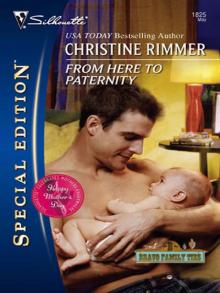 From Here to Paternity
From Here to Paternity Almost a Bravo
Almost a Bravo Her Favorite Maverick
Her Favorite Maverick A Husband She Couldn't Forget
A Husband She Couldn't Forget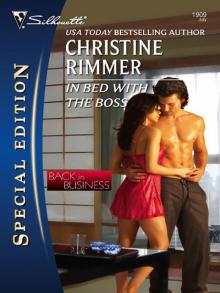 In Bed with the Boss
In Bed with the Boss Bravo Christmas Reunion
Bravo Christmas Reunion The Maverick Fakes a Bride!
The Maverick Fakes a Bride! The Tycoon's Instant Daughter
The Tycoon's Instant Daughter The Bravo Bachelor
The Bravo Bachelor 37 Her Highness and the Bodyguard
37 Her Highness and the Bodyguard A Bravo for Christmas
A Bravo for Christmas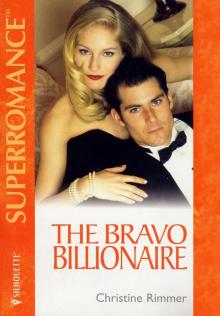 THE BRAVO BILLIONAIRE
THE BRAVO BILLIONAIRE The Rancher's Christmas Princess
The Rancher's Christmas Princess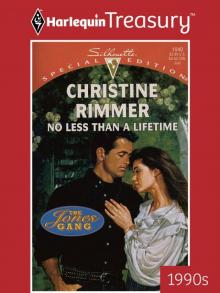 No Less Than a Lifetime
No Less Than a Lifetime A Bravo Christmas Reunion
A Bravo Christmas Reunion Marooned with the Maverick
Marooned with the Maverick Their Secret Summer Family (The Bravos 0f Valentine Bay Book 7)
Their Secret Summer Family (The Bravos 0f Valentine Bay Book 7) Carter Bravo's Christmas Bride
Carter Bravo's Christmas Bride Stroke of Fortune
Stroke of Fortune THE MILLIONAIRE SHE MARRIED
THE MILLIONAIRE SHE MARRIED Marriage, Bravo Style!
Marriage, Bravo Style!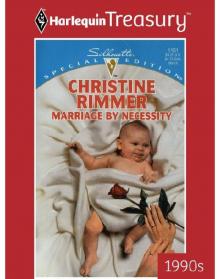 Marriage By Necessity
Marriage By Necessity Marrying Molly
Marrying Molly Married in Haste
Married in Haste A DOCTOR'S VOW
A DOCTOR'S VOW Bravo Unwrapped
Bravo Unwrapped![A Maverick to [Re]Marry Read online](http://i1.bookreadfree.com/i/03/24/a_maverick_to_remarry_preview.jpg) A Maverick to [Re]Marry
A Maverick to [Re]Marry Born Innocent
Born Innocent The Bravo Family Way
The Bravo Family Way The Reluctant Princess
The Reluctant Princess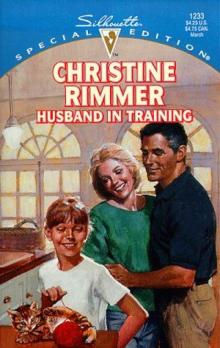 Husband in Training
Husband in Training HOLIDAY ROYALE
HOLIDAY ROYALE James Bravo's Shotgun Bride
James Bravo's Shotgun Bride The Maverick's Accidental Bride (Montana Mavericks: What Happened At The Wedding Book 1) (Contemporary Cowboy Romance)
The Maverick's Accidental Bride (Montana Mavericks: What Happened At The Wedding Book 1) (Contemporary Cowboy Romance) The Stranger and Tessa Jones
The Stranger and Tessa Jones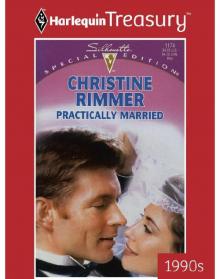 Practically Married
Practically Married The Good Girl's Second Chance (The Bravos Of Justice Creek 2)
The Good Girl's Second Chance (The Bravos Of Justice Creek 2)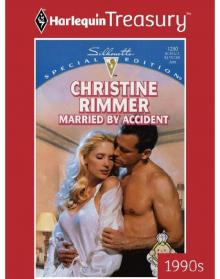 Married by Accident
Married by Accident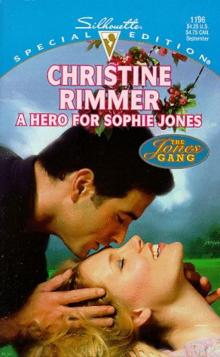 Christine Rimmer - A Hero for Sophie Jones
Christine Rimmer - A Hero for Sophie Jones A Bravo Homecoming
A Bravo Homecoming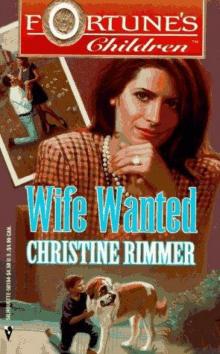 Wife Wanted
Wife Wanted Harlequin Special Edition July 2013 - Bundle 1 of 2: Marooned with the MaverickHer McKnight in Shining ArmorCelebration's Bride
Harlequin Special Edition July 2013 - Bundle 1 of 2: Marooned with the MaverickHer McKnight in Shining ArmorCelebration's Bride Her Favorite Maverick (Montana Mavericks: Six Brides For Six Brother Book 1)
Her Favorite Maverick (Montana Mavericks: Six Brides For Six Brother Book 1)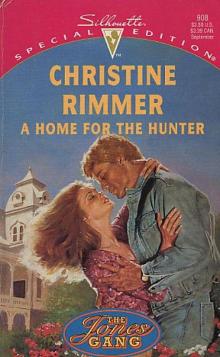 A HOME FOR THE HUNTER
A HOME FOR THE HUNTER![A Maverick to [Re] Marry Read online](http://i1.bookreadfree.com/i1/04/03/a_maverick_to_re_marry_preview.jpg) A Maverick to [Re] Marry
A Maverick to [Re] Marry Lori’s Little Secret
Lori’s Little Secret Stranded with the Groom
Stranded with the Groom Sunshine and the Shadowmaster
Sunshine and the Shadowmaster The Last Single Maverick
The Last Single Maverick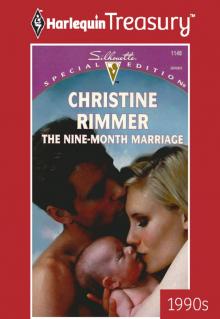 The Nine-Month Marriage
The Nine-Month Marriage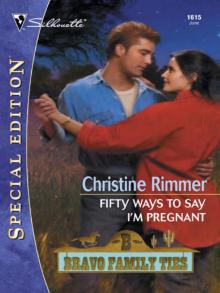 Fifty Ways to Say I’m Pregnant
Fifty Ways to Say I’m Pregnant Ms. Bravo and the Boss
Ms. Bravo and the Boss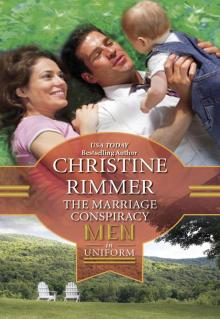 The Marriage Conspiracy
The Marriage Conspiracy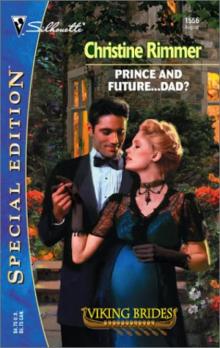 Prince and...Future Dad
Prince and...Future Dad Not Quite Married
Not Quite Married The Reluctant Cinderella
The Reluctant Cinderella Their Child?
Their Child? Marriage, Maverick Style!
Marriage, Maverick Style! Donovan's Child
Donovan's Child A Bride for Jericho Bravo
A Bride for Jericho Bravo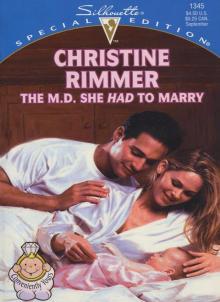 THE M.D. SHE HAD TO MARRY
THE M.D. SHE HAD TO MARRY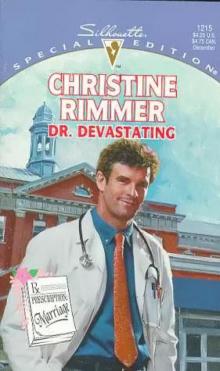 DR. DEVASTATING
DR. DEVASTATING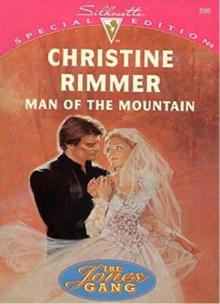 MAN OF THE MOUNTAIN
MAN OF THE MOUNTAIN The Prince's Cinderella Bride
The Prince's Cinderella Bride Rachel's Bundle of Joy
Rachel's Bundle of Joy HOW TO MARRY A PRINCESS
HOW TO MARRY A PRINCESS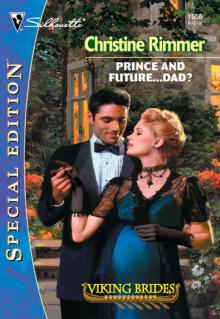 Prince and Future... Dad?
Prince and Future... Dad? The Prince She Had to Marry
The Prince She Had to Marry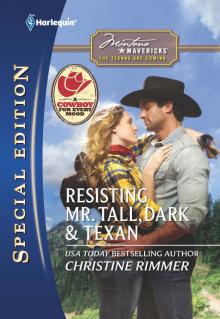 Resisting Mr. Tall, Dark & Texan
Resisting Mr. Tall, Dark & Texan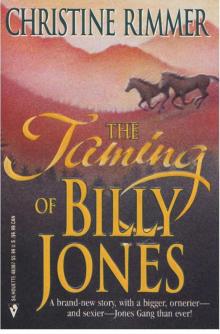 The Taming of Billy Jones
The Taming of Billy Jones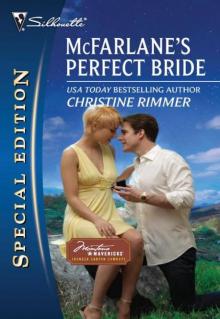 McFarlane's Perfect Bride
McFarlane's Perfect Bride The Lawman's Convenient Bride
The Lawman's Convenient Bride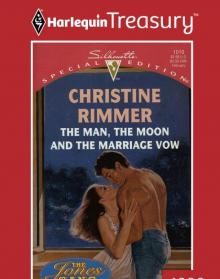 The Man, The Moon And The Marriage Vow
The Man, The Moon And The Marriage Vow A Bravo Christmas Wedding
A Bravo Christmas Wedding Scrooge and the Single Girl
Scrooge and the Single Girl Harlequin Special Edition October 2015, Box Set 1 of 2
Harlequin Special Edition October 2015, Box Set 1 of 2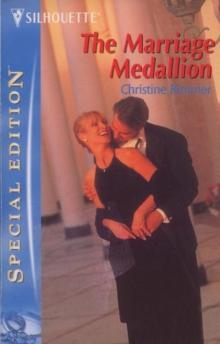 The Marriage Medallion
The Marriage Medallion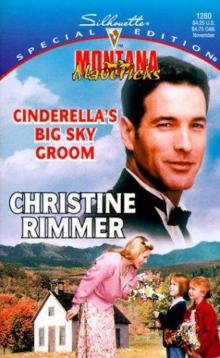 Cinderella's Big Sky Groom
Cinderella's Big Sky Groom 33 The Return of Bowie Bravo
33 The Return of Bowie Bravo The Prince's Secret Baby
The Prince's Secret Baby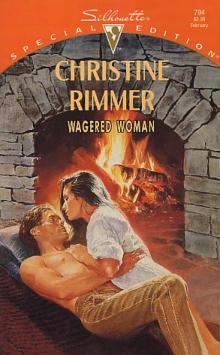 WAGERED WOMAN
WAGERED WOMAN